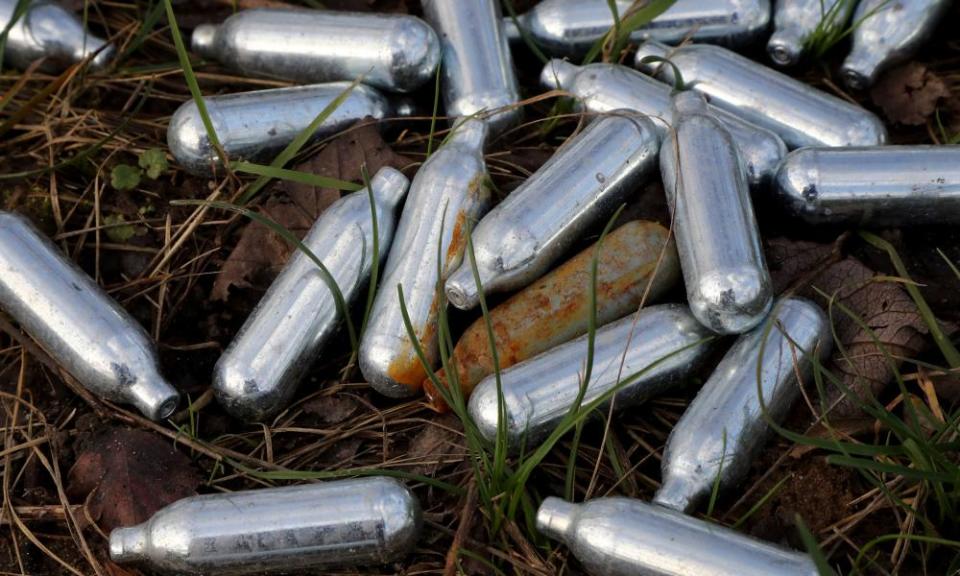Blacksmith recycles canisters into cult kitchen knives for zero-waste foodies
Tim Westley takes up chef friend’s challenge to transform laughing gas litter
The little steel bulbs that litter parks, roadsides and city centres – the discarded canisters from Britain’s second favourite drug, laughing gas – cause misery to many communities. But now one blacksmith has found an innovative use for them: turning them into handmade kitchen knives.
The prevalence of the canisters has prompted some councils to impose local bans, while the home secretary is keen to outlaw them nationally. But Tim Westley’s handmade kitchen knives are gaining a cult following among environmentally conscious foodies after being endorsed by chefs committed to low waste.
Since promising to make at least two-thirds of his blades from empty “nos” canisters, Westley knives are selling in record time on his website, Clement Knives. “I usually make about five a week, and when they go on the site there’s a rush to buy them, especially in the run-up to Christmas. This week it was only two or three minutes before they were all gone,” he said.
“I’d like to think customers are buying them because they like the zero-waste concept rather than that they just want a knife.”
Westley, 33, a former artist-in-residence at London’s Museum of Water & Steam, moved his forge to south-west Scotland last year. He has always been committed to knife making using recycled materials, including metal dredged from canals with magnets. Then, on walks with his dog, Mayday, he became troubled by the sight of littered piles of canisters, and worried that they posed a risk to cyclists of skidding.

Last year his friend Douglas McMaster, the founder of Silo, the UK’s first zero-waste restaurant, challenged Westley to recycle the canisters into knives. The resulting experiment proved such a success that Westley has promised to only use recycled canisters for all his blades. For the handles he uses recycled plastic.
According to Home Office figures, nitrous oxide, or laughing gas, is the second most popular drug among 16- to 24-year-olds, behind cannabis.
The government is consulting on making the possession of laughing gas a crime. However, the drug charity Release has cautioned against criminalising what is a relatively benign substance if heavy use is avoided.
But there is consensus that laughing gas’s popularity has created an ugly littering problem. Westley is doing his bit to reduce this modern form of waste, using traditional blacksmiths’ techniques.
For a typical 210mm blade he uses 10 nos canisters in a process he says is laborious but worthwhile. He first cuts off the ends of the canisters with an angle grinder, then opens and flattens them with a hammer on an anvil.
The flattened pieces of soft steel are then forge welded on either side of a harder carbon steel used for the sharpened edge. Westley said: “It’s call San Mai, which has been used for years by Japanese knife makers. They use two soft layers of steel around a hard steel in the middle. The only difference is that I use nos canisters for the soft steel. It’s using an ancient technique to address a modern problem.”
He added: “It is more hassle, but it’s worth it because we should be using more of the materials we already have. My knives are just as good, if not better, made with materials found off the street. And there is no industrial processes involved, so there is zero waste.”
In fact, Westley says the knives use more waste than they create. All the steel off-cuts go to a scrap metal dealer and the worn sanding belts used for polishing the blades are turned into plant pots.
Westley gave the first nos canister knife he made to McMaster and has been supplying his restaurant with knives ever since. McMaster said they equalled any knife he had used, despite their grungy appearance caused by the recycled materials involved.
His chef colleagues at the low-waste London pizzeria Crate are also using them, and McMaster is planning to feature Westley’s knives on his Zero Waste Cooking School YouTube channel.

 Yahoo Movies
Yahoo Movies 
